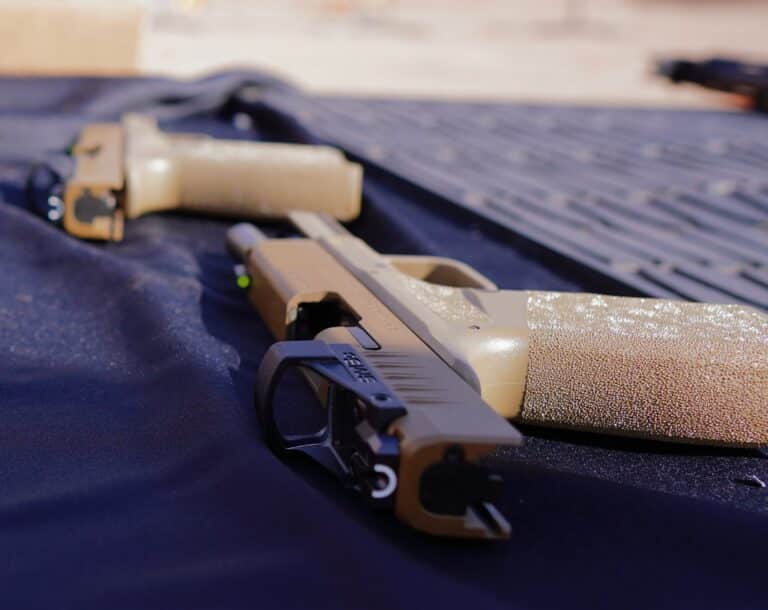San Jose’s novel gun ownership fee and insurance mandate were just upheld, and they have a better chance of surviving a Supreme Court challenge than many hardware bans.
Last Thursday, U.S. District Judge Beth Freeman found the city’s first-of-its-kind ordinance doesn’t violate the Second Amendment. She ruled the restrictions were in line with the historical tradition of gun regulation during the Founding Era, as required under the test set out by SCOTUS in New York State Rifle and Pistol Association v. Bruen.
“[W]hether the standard was strict liability or negligence, the Nation nonetheless maintained a ‘historical tradition’ of shifting the costs of firearm accidents from the victims to the owners of the implicated firearms,” Judge Freeman, an Obama appointee, wrote in NAGR v. San Jose.
A law that imposes a gun restriction that has literally never been tried before doesn’t seem like a good candidate to survive Bruen‘s history-based test. And there are several significant weaknesses with Judge Freeman’s argument, but it does employ historical analogues that are closer in nature than many of the ones other federal judges have used to uphold various hardware bans.
That’s because the insurance mandate is much more similar to a well-established historical gun regulation than any general ban on owning certain kinds of guns or accessories. Surety laws were discussed at length in Bruen as a series of laws from the relevant time period that may be used as the basis to uphold a modern law. SCOTUS found they weren’t a close enough match to justify New York’s restrictive and subjective gun-carry permit law, but they could be closer to what San Jose is doing.
Certainly, that’s what Judge Freeman argued.
“[T]he Court finds that surety laws and the Insurance Requirement share substantial overlap as to the ‘how and why the regulations burden a law-abiding citizen’s right to armed self-defense,'” she wrote, quoting Bruen‘s standard.
Surety laws were adopted by several states in the late 18th century and did operate as a kind of pseudo-insurance. Those subject to the laws would have to post a bond in order to carry a gun. And, if they broke the peace, the surety would be used to pay for the damages.
Still, historical surety laws are different from San Jose’s insurance mandate in a number of substantial ways. For one, only people who were directly and specifically accused of being a potential threat to the public peace had to post a surety. And they only had to do so in order to carry a firearm.
San Jose’s mandate is a general requirement for everyone who wants to just own a gun, not carry it.
Judge Freeman noted these distinctions in her ruling. She admitted they were real but found they weren’t enough to push the modern novel regulation outside the scope of acceptable analogues.
“Plaintiffs argue that surety laws are distinguishable because these laws imposed a financial burden ‘only after an individual was reasonably accused on intending to injure another or breach the peace,'” Judge Freeman wrote. “The Court rejected this argument in its Preliminary Injunction Order, stating that while NAGR Plaintiffs have identified a fair distinction between surety laws and the Insurance Requirement, the distinction ultimately does not bear upon the metrics identified in Bruen.”
She further argued the insurance mandate may apply to every gun owner but, as with surety laws, its burden will only be substantial for those individuals who are considered a high risk to use firearms irresponsibly.
“[T]here is no evidence on how low gun liability insurance premiums may be for low-risk gun owners. (estimating a baseline premium of about $20 per year for an average firearm owner),” she wrote. “A de minimis low-risk premium could retain analogical resemblance to the de minimis (but nonetheless discernible) burdens that surety laws imposed on low-risk gun owners in the 19th century. Bruen, 142 S. Ct. at 2149 (acknowledging that ‘the hypothetical possibility of posting a bond’ may be a burden but ‘the burden these surety statutes may have had on the right to public carry was likely too insignificant’). Bruen does not demand a ‘historical twin,’ and neither will this Court.”
Perhaps SCOTUS will agree with that conclusion. It doesn’t seem terribly likely, but it is a closer call than with the analogues offered up to justify Delaware’s AR-15 ban or Oregon’s magazine restrictions. Rulings upholding those laws rely on either much more generalized analogues that aren’t hardware bans and often come much later in American history, arguably after the period SCOTUS considers controlling.
The city’s gun ownership tax, which it and Judge Freeman argue is actually just a fee, may be even better positioned than the insurance mandate. That’s not necessarily because there are more historical laws that justify its existence, but because several key members of the Court have expressed openness to upholding at least some fees attached to the exercising of gun rights.
She found the fee, which is intended to go to a non-profit dedicated to mitigating the effects of gun violence, lines up with historical negligence liability standards–even though those standards applied specifically to individuals who’d negligently fired their guns rather than all gun owners. But, perhaps more importantly, she also determined charging a fee connected to exercising Second Amendment rights was not inherently unconstitutional. For that determination, she relied heavily on the Bruen concurrence authored by Justice Bret Kavanaugh and joined by Chief Justice John Roberts.
“The Supreme Court in Bruen expressly contemplated regulations that may permissibly include fee payments, so long as the fees were not so ‘exorbitant [so as to] deny ordinary citizens their right to public carry,'” Judge Freeman wrote. “The Fee amount has been set at $25. As Defendants argued, several courts that analyzed the constitutionality of fee requirements prior to Bruen upheld fees of amounts much larger than $25.”
Since Bruen sets gun carry on the same plane of protection as gun ownership, she has a point. If, as Kavanaugh and Roberts suggest, charging fees or placing training requirements on gun carry is acceptable, then doing the same on gun ownership likely will be as well. Of course, that will only be true of fees or other requirements that are minimally burdensome–something that has likely led San Jose to scale back its enforcement plans.
Judge Freeman’s findings will probably struggle for a couple reasons if they do make it up to the High Court. Chief among these is the fact that surety laws were specifically targeted at people accused of being dangerous and they were implicitly about gun carry.
The most glaring weak point of Judge Freeman’s argument is more straightforward, though. Bruen allows for a broader reading of historical laws to find an analogue that may get San Jose’s novel ordinance close to the line of constitutionality, but only in the case where technological advancement has created a modern problem the Founders couldn’t have foreseen. San Jose’s efforts are aimed at preventing or mitigating accidental shootings and general gun violence, both of which are issues that certainly existed in the Founding Era.
The Bruen test becomes simpler at that point. If the Founders didn’t implement a gun law that was “substantially similar” to the modern regulation, then it’s not constitutional. Surety laws may be sort of like an insurance mandate, enough to at least make justices think hard about the possibility under the looser standard, but it’s difficult to argue the two are direct analogues. The same is true for San Jose’s gun ownership fee.
The Founders never implemented a general gun ownership tax or insurance requirement. San Jose probably can’t do the same, but the idea is probably closer to garnering five votes at SCOTUS than the high-profile hardware bans working their way through the courts. If the High Court opts for a more generalized view of what constitutes an acceptable historical analogue for modern regulations in its upcoming decision for United States v. Rahimi, expect San Jose’s mandates to have a good shot at surviving and becoming much less novel as other blue states adopt the restrictions.







7 Responses
Thank you The Reload. I just want to yell out “Shall Not Be Infringed!” and have that magically change Aunty Anti’s mind. But she’ll just contemptuously grin at my grito, knowing she’s won on that front. Man, my heart goes out to CA and especially San Jose gun owners.
What are “ordinary citizens”, and if they can’t reach “minimally burdensome” firearms fees and insurance, does that now make them “extraordinary” and not legal to exercise an enumerated Constitutional right? And I can see Middleman Marvin and Moderate Molly nodding in approval at Aunty Anti, if a “compromise” is eventually reached for these burdensome fees and insurance, and they only apply to public carry like with automobiles.
I agree that the point of these fees and requirements seems more to raise the bar for gun ownership than have any sort of direct practical impact on violence. Of course, that’s because the people advocating for it generally believe making it harder to own guns is itself a positive outcome that will reduce crime. But, as you note, for the less well off among us any new barrier to legal ownership is going to have an outsized impact, even if a government hardship waiver process exists since the confusion and time costs associated with that will still exist.
I think it’s likely at least three or four justices would find that to be too much of a burden on their Second Amendment rights. I’m not sure a majority would since they’ve put owning guns on the same level as carrying guns and are clearly open to fees and other requirements for the later.
But I’d still think this doesn’t survive scrutiny for the other reasons mentioned if it does reach the High Court. But a refined proposal might, especially if Rahimi makes the Bruen test a bit easier to pass.
Maybe someone should point out that by that standard poll taxes are Constitutional.
Yes, I feel like it would be much more obvious to people if there were a city that imposed a $25 fee to be able to express 1st amendment rights. “Oh, you want to go to church in our city? You must pay $25 each year.” Is it minimally burdensome? Sure, almost anyone can find $25 dollars (and perhaps tithe more than that, or at least throw that much into the offering plate over the course of a year), but hopefully it would make the hairs stand up on some necks to be made to pay the government to exercise a right in the constitution. But there is too much emotionally charged thinking around the 2nd amendment for people to see it as an equivalent issue.
Yea, I tend to agree with you guys on this point. There may be a better argument for charging fees for the direct work involved in issuing a permit (though that raises issues too) than a fee trying to address a societal issue like general violence. Perhaps the Court will agree too. I just think Kavanaugh/Roberts opened the door to more potential fees or taxes in their concurrence and haven’t explained where they see the line beyond fees being too expensive.
It seems very odd to me that this court found the government can mandate a payment in order for a citizen to exercise a Constitutional right. How is this not like having to pay a tax to vote, go to church, or to read a newspaper? Ruling this law “Constitutional” just seems like a contorted rationalization.
Politicians and judges seem to believe the ends justify the means, the end in this case being to make private citizens’ gun ownership more difficult and more expensive. They don’t trust the average person and they see it as their absolute right to limit their access to guns “by any means necessary.”
“Where rights secured by the Constitution are involved, there can be no rule making or legislation which would abrogate them.” Miranda vs. Arizona, 384 US 436 p. 491.
“All laws which are repugnant to the Constitution are null and void.” Marbury vs. Madison, 5 US (2 Cranch) 137, 174, 176, (1803)
Of course, these days it seems the Constitution only means what the political and judicial elite wants it to mean and the idea we citizens have individual, inalienable rights is a dead letter.
I think that’s a good question. It may be that the Court sees a distinction between a fee to process a ccw permit application us different from a fee to pay for services that mitigate the effects of gun violence. But the Kavanaugh/Roberts concurrence does open the door for fees being attached to exercising gun rights without fleshing out why that’s acceptable under the Bruen standard.